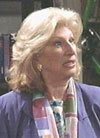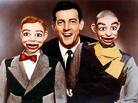Books: “Growing Up Laughing”
December 5, 2010
Danny Thomas used to do a monologue about a man who got a flat tire and then discovered that he had no jack in his car. He had no choice but to walk to a gas station that was miles away, and the routine consisted of this guy muttering to himself as he trudges along the road. Already annoyed, he makes himself angrier by imagining how the garage owner will try to take advantage of him. He is so furious by the time he reaches the station that he verbally attacks the unwitting mechanic, telling him what he can do with his jack. Some people could tell that story in a few sentences; Thomas could make it last ten minutes. That was the genius of the saloon comic whose talent and know-how made him a television mogul.
Thomas was a popular guy in our house, not only because he was funny but because he had Lebanese parents. My mother’s parents were from Lebanon, and when Thomas became a national figure, he was the only one who shared that heritage. The Lebanese were once regarded in our country as exotic, so much so that my mother told me that her parents instructed her to say she was French if anyone should ask. Danny Thomas with his broad popularity and his frequent acknowledgement of his background provided a chance to wave the flag.
 The story has been told often enough about how Thomas, when it appeared that he might never succeed as an entertainer, promised St. Jude that if his fortunes changed he would build a shrine to the saint. Even St. Jude might have forgiven someone for dismissing a vow made in desperation, but Thomas stuck to his word and, in the process, made himself one of the heroes of 20th century America.
The story has been told often enough about how Thomas, when it appeared that he might never succeed as an entertainer, promised St. Jude that if his fortunes changed he would build a shrine to the saint. Even St. Jude might have forgiven someone for dismissing a vow made in desperation, but Thomas stuck to his word and, in the process, made himself one of the heroes of 20th century America.
When Thomas first launched a campaign to raise money for his project, the backbone of the drive then as now was the Arab-American community, including several of my mother’s Lebanese cousins. My parents attended fundraising events, including one at which Thomas and his wife, Rose Marie, appeared.
I figured that tenuous connection was better than nothing when I had an opportunity last year to share a meal with Marlo Thomas, one of Danny Thomas’s three children. I needn’t have bothered. She is a gracious and open woman who doesn’t require pandering. She and her siblings are also their father’s successors as heroes, making an extraordinary commitment to generating support for the hospital he founded. Although it has been operating since 1962, the mission of St. Jude Children’s Research Hospital – to treat children with catastrophic pediatric diseases regardless of their families’ ability to pay – seems more like a dream than a reality The hospital has operating costs in the neighborhood of $1.5 million a day. Someone who joined us at dinner asked Marlo about covering that nut. “How do you do it?” he said. And she answered: “We do it.” I have often thought about that answer; it reveals a combination of determination and confidence that I have encountered in leaders of other charitable enterprises.
 Marlo Thomas, on her own, has had a remarkable career. She is a talented dramatic and comic actress, and her TV series “That Girl” was a benchmark in prime time representation of independent women. Her project “Free to be You and Me” — a record album, a TV special, and a book — broke new ground in eliminating the image of the helpless or subservient female that infected traditional children’s literature and entertainment.
Marlo Thomas, on her own, has had a remarkable career. She is a talented dramatic and comic actress, and her TV series “That Girl” was a benchmark in prime time representation of independent women. Her project “Free to be You and Me” — a record album, a TV special, and a book — broke new ground in eliminating the image of the helpless or subservient female that infected traditional children’s literature and entertainment.
She has recently published her sixth book, “Growing Up Laughing.” This book alternately recounts her childhood and adolesence in the Thomas household — which was frequently extended to include the likes of Sid Caesar, Milton Berle, and Jan Murray — and her conversations with contemporary comics about the origins of their own funny bones. Jerry Seinfeld, Kathy Griffith, Whoopi Goldberg, Don Rickles, Chris Rock, and Robin Williams are among them. The observations of these modern performers supplement the wisdom that Marlo Thomas gleaned from her exposure to the wits of her dad’s generation. The book is entertaining and full of insights about both the inspiration and the discipline of comedians.
I particularly liked Jerry Seinfeld’s explanation of his remark that comedy doesn’t belong on the arts pages, but on the sports pages:
One of the things that drew me to comedy was that it’s a simple world. It doesn’t require the interpretation of any critic to tell you whether something is good or not good. If the audience is laughing, the guy’s good. If they’re not laughing, he’s not good. Period. And that’s the analogy to sports: You can talk all you want about how two teams played in a game. But we all know who won at the end. There’s no debate. It doesn’t require any perception. … Standup comedy doesn’t require value judgments. If you get laughs, you work; if you don’t get laughs, you don’t work. It’s all about the score.
Many years ago, I wrote a story about a group of college students who were fans of the “Honeymooners” television series. These students hadn’t been born in the 1950s when the show had its initial run, but they couldn’t get enough of it. Although I do the same thing with “The Honeymooners” and some other vintage shows, I asked them why they watched the episodes so often that they could recite most of the dialog, and they told me that the way the writers and actors used language was one of the things that fascinated them.
Fast forward to “Seinfeld,” which still holds my interest partly because of the way the writers and actors used language — for instance, a particular device, very New York to my ear, used to evoke comparisons. This phraseology was used seven times in the series — five times by Jerry speaking to George or Elaine, once by Helen Seinfeld speaking to Jerry, her son, and once by George, speaking to Elaine.
The one instance in which Jerry wasn’t the speaker occurred in the series premiere, “The Stakeout,” in which Jerry tries to flirt with a woman he meets at a dinner party, annoying Elaine, who is, in effect, his date at the party. The next day, when Jerry’s visiting mother tells Jerry that Elaine called while he was out, he asks, “What was the tone of her voice? How did she sound?” To which Helen replies: “Who am I — Rich Little?”
In the episode known as “The Jacket,” Jerry makes a reference to composer Robert Schumann, but mispronounces the name, putting the accent on the first syllable. George says, “Artie Schumann, from Camp Hatchapee?” To which Jerry answers, “No, you idiot!” And George says, “Who are you — Bud Abbott? Why are you calling me an idiot?”
In “The Trip,” in which Jerry invites George to accompany him on a trip to Los Angeles, George arrives at Jerry’s apartment with a big pile of luggage. Jerry looks at the bags and says: “It’s a three-day trip. Who are you — Diana Ross?”
In “The Revenge,” George plans to get back at the boss who fired him from a real estate firm by slipping the boss a “mickey” at the firm’s anniversary party. When George reveals this plan, the incredulous Jerry says: “Who are you — Peter Lorre?”
In “The Wink,” Elaine tells Jerry that she has agreed to go on a date with the man who calls from her wake-up service. Jerry says: “I still can’t believe you’re going out on a blind date.” Elaine answers: “I’m not worried. It sounds like he’s really good-looking.” To which Jerry answers: “You’re going by sound? What are we — whales?”
And in “The Limo,” Jerry and George find themselves in a limousine with two neo-Nazis who think George is their leader. George suggests that they extricate themselves by jumping out of the moving car. “We’re doing sixty miles an hour!” Jerry says. “So we jump and roll,” George explains. “You won’t get hurt.” And Jerry replies: “Who are you — Mannix?”
Finally, in the episode in which NBC president Russell Dalrymple gets food poisoning after Elaine sneezes on his pasta primavera, George has a tumultuous session with his counselor, Dana, played by Gina Hecht. During the session, Dana tells George that she read the script for a sit-com pilot Jerry and George have pitched to NBC, and she was not impressed. When George repeats this to his friends, Elaine — who recommended Dana — says, “Maybe she didn’t think it was funny,” to which George replies, “Oh, she didn’t think it was funny? What is she – Rowan and Martin?”
Who are you? Who am I? A very “exerstential” question, as Elaine Benes observed.
For a list of actual people referred to in “Seinfeld” scripts, click on THIS LINK.











